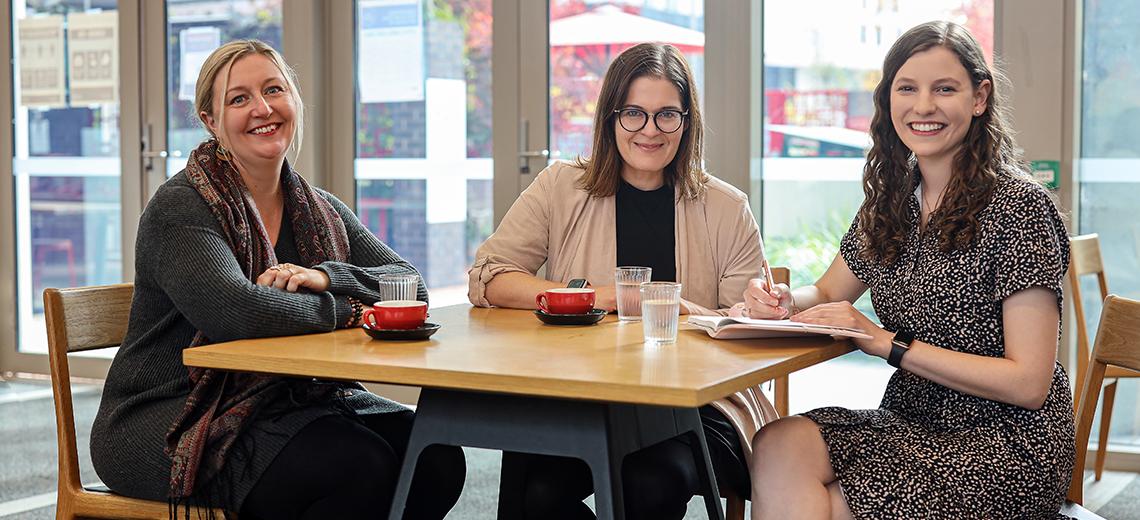
8 minute read
Studying at university is an enriching experience, but can also be challenging. To assist students throughout their studies, the ANU College of Business and Economics (CBE) offers numerous resources, support services and opportunities.
CBE student Mia De Bortoli, who is pursuing a Bachelor of Business Administration and Bachelor of Commerce, sat down with
Dr Jenni Bettman, the College’s Director of Students and Learning and Dr Bronwen Whiting, our Associate Dean of Education, to discuss getting the most out of your time at ANU.
Over a coffee, Jenni and Bronwen shared their tips on embracing your first year, hybrid learning, and developing a high-performance mindset for the workplace.
Q. Commencing study at university can be overwhelming. What opportunities and services are available to first year students to help them confidently transition to uni life?
Jenni:
It’s critical that students read their student email, through which they will receive details on upcoming College events, academic assistance and other important campus related information. The CBE Student Services team is also a great ’go-to’ for students who need to be pointed in the right direction or require advice about their programs. Other important services available include ANU Academic Skills; ANU Students' Association, ANU Postgraduate and Research Students' Association; ANU Student Central; Dean of Students; and ANU Thrive. I really believe one of the biggest learning curves for first-year students is knowing that there are people they can reach out to for assistance.
Bronwen:
The main advice I would give any student starting uni is to meet new people through everything that you do – in classes, tutorials, and social events. Uni can be hard, and it can feel really isolating, but when you make friends and create networks it can help you overcome almost every challenge.
As Jenni has mentioned, there are many different university-wide services available. Some useful resources include ANU Library, through which students can access an extensive catalogue of material, and ANU Counselling, who facilitate lots of group sessions as well as individual appointments. There are also mentoring programs such as Set4ANU that help those new to ANU settle in, and various student clubs and societies, such as the Actuarial Finance Economics Commerce society, that provide a great way for you to meet and socialise with like-minded peers.
I always tell students to read the news to get an understanding of what is happening in the world, not just in business, but also in current and political affairs. Awareness is a really important skill for students to have.
Q. From your experience, what effective strategies can students implement in the current pandemic-induced hybrid-learning environment?
Jenni:
I think it’s crucial that students enforce a very good time management and structured approach to learning. When learning is all face-to-face, you follow a schedule and arrive at classes at the right time, whereas in the hybrid-learning environment space, you can often be tempted by distractions if a teaching component is not live. I also think it’s important to identify the best way you work – recognising how long you can study effectively, and what the optimal environment is for you to be productive. Hybrid learning, at times, can give you more control of the pace at which you learn, but you should be careful not to fall behind. In addition to this, ensuring you stay involved in live sessions will keep you on track for successfully completing your courses. In short, being engaged is definitely the key to success in this new space.
Bronwen:
Make a realistic and achievable schedule for the week – prioritise classes you need to attend, listen to, or watch, which require readings or are supplemented with tutorials. Balance this academic-side of your week with your other important personal commitments such as work shifts, exercise, cooking, various leisure activities and spending time with your friends and family. Include the things that make your life fun, and allow for the time for them as well as your uni work.
Be extremely cautious of COVID-19 related procrastination habits, especially since some of your classes might be pre-recorded. This is when your schedule will help you efficiently integrate your study with your personal time.
Q. In preparation for their future careers, how can final year students develop a professional and high-performance mindset?
Jenni:
CBE offers many programs and guidance in the professional space through the College’s Careers and Student Employability team. The University also hosts a number of public lectures, which I believe provide another way of getting into a professional and high-performance mindset. Final year students need to start thinking about what their future employer is looking for and what is actually going on out there in the ‘big, bad world’. I always tell students to read the news to get an understanding of what is happening in the world, not just in business, but also in current and political affairs. Awareness is a really important skill for students to have.
Bronwen:
I have noticed that our penultimate and final year students already have a really professional and high-performance mindset, and produce incredible work, such as those presenting to industry clients through the Special Industry Project and the ANU Student Managed Fund.
The steps students take through their degrees – the courses they are enrolling in at CBE; the activities they take part in; the way they engage with the CBE Careers and Student Employability team; and their part-time work all collectively mould these students to become high performing professionals.
Take advantage of all the opportunities that come your way and interest you as every experience will help develop the skills you need for your future workplaces. Within your classes, note all the feedback you get to help you improve your work. Constantly trying to do better is one of the most important things in any work you do, either at uni or in your future career.
The ANU College of Business and Economics offers an extensive range of specialised programs. Click here for more details.
